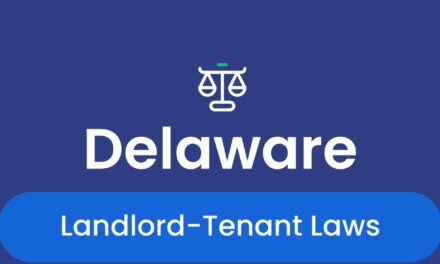Operating rental houses in Delaware requires a clear understanding of landlord-tenant laws specific to the state. Rental property managers are responsible for following laws related to rent receipt, lease terms, tenant screening, deposits, and eviction. Staying informed on these laws avoids legal disputes, explains moral standards, and improves landlord-tenant relationships.
Regardless of whether operating a single-unit residence or a portfolio of multihousing units, Delaware property managers must comply with the following legal regulations in order to do business effectively and protect their clients and tenants. The following are the key laws all Delaware property managers should understand.
Overview of Key Rental Laws Landlords Should Know

1. Application Fee Limits
Landlords are allowed to charge a rental application fee, but not more than $50 or 10% of the monthly rent—whichever is higher. This is to cover the cost of the background and credit checks.
2. Security Deposit Requirements
For leases over one year, landlords are prohibited from taking more than a month’s rent as a security deposit. However, for tenancies by month, there is no limit on the deposit.
3. Returning the Security Deposit
Landlords are required to, within 20 days after a lease expires, refund the security deposit. Where deductions are made for damage, tenants are notified via writings. Tenants have 10 days to dispute any charges.
4. Lease Terms
Landlords can offer month-to-month situations or fixed leases which are for one year or more. Any lease which is for 12 months or more has to be in writing.
5. Rent Hikes & Late Charges
Rent can be raised when a lease term expires, but tenants must receive a 60-day notice beforehand. Landlords may impose a fee for late rent—but not over 5% of monthly rent.
6. Disclosure of Ownership
Landlords are legally required to inform tenants of the owner’s name and business address or provide the same information for a resident agent.
7. Maintenance Needs
Rental housing is to be brought up to all current building and housing codes. Landlords are responsible for maintaining a safe and habitable dwelling for their renters.
8. Pre-terminated Lease by Tenants
In the event that a landlord neglects or refuses to perform repairs or adhere to housing or safety codes, tenants may pre-terminate the lease penalty-free.
Tenant Screening Laws in Delaware
If you’re a Delaware landlord or property manager, screening tenants is an essential step—but it includes significant legal responsibilities. The state has clear guidelines that will help you make responsible decisions while treating all applicants equally and legally.
Fair Housing Guidelines for Delaware Landlords

Delaware homeowners are subject to state and federal fair housing laws that mandate consideration of the following in screening potential tenants: race, color, religion, sex, national origin, handicap, or family status. Delaware law also gives extra protection to age, marital status, and source of income.
When marketing your rental, avoid using words that imply preference—such as “perfect for young professionals” or “not recommended for families.” Words count and can be perceived as discriminatory, even though they are not meant to be.
The entire screening process must be consistent and clear. The same form and same fee must go to all the applicants and be judged by the same criteria. If you ask someone for extra documents and not another, it can lead to problems in law. Maintain good records of all documents and processes in your property management software. If you are turning down someone, be ready to provide reasons—with simple, non-discriminatory reasons.
Running Background Checks in Delaware
Delaware landlords are allowed to charge an application fee in order to cover background and credit report expenses. Accounting to the law the fee shouldn’t be greater than $50 or 10% of the monthly rent—whichever amount is higher, and it’s not returnable. Landlords must comply with the requirements of the Fair Credit Reporting Act (FCRA) when they run background reports. This includes:
- Getting prior written consent from the applicant before using any report
- Informing the applicant whether the report was used in rejecting them
- Disclosure of information regarding the credit or background agency utilized
You can also run criminal history checks, but it’s important to have a clear policy that defines which convictions are relevant to rental decisions. Avoid blanket bans—consider factors like how recent the offense was and whether it poses a legitimate risk.
Credit checks can be useful when determining financial stability, but don’t rely solely on a credit score. A low scorer isn’t always a risk for a tenant. Consider the overall picture, such as job stability, on-time utility payments, rental history, and gross income.
Rent Collection Rules in Delaware

In Delaware, there are guidelines that landlords must follow in regard to accepting rent. The rules eliminate any tension between landlords and tenants by clearly explaining when and under what conditions payment of rent must be made, and what specifically occurs when it is late. While the lease makes the specifics, Delaware law sets the foundation of equity for both parties.
Late Fees and Grace Periods
Delaware allows landlords to levy late fees if rent isn’t paid on time—but there’s a loophole. The fee must be reasonable and included clearly in the lease agreement. The state doesn’t have a definite cap, so it’s up to the landlord to decide what is a reasonable means within local parameters.
Of note, Delaware law does not have any required grace period. Therefore, the rent is technically due on the date specified in the lease. While a 5-day grace period is very common from a landlord’s perspective as an act of courtesy, it is not mandatory unless it is expressly stated in the rental agreement.
For rent due month by month under a renewal lease, it shall generally be payable at the commencement of a month unless otherwise specified in writing. Delaware law provides that, unless agreed otherwise, the entire rent in advance shall be due for any term of a month or shorter of a lease.
Acceptable Rent Payment Methods
Delaware doesn’t restrict how landlords can collect rent, which gives property owners and managers some flexibility. Landlords can choose the methods that best suit their operations, such as:
- Personal checks
- Money orders
- Cash (must include a written receipt)
- ACH or bank transfers
- Credit/debit card payments
- Online rent payment platforms
If you’re accepting cash, it’s crucial to provide a written receipt every time. This protects both the landlord and the tenant by creating a clear paper trail.
Landlords can also specify payment modes of choice in the lease. However, they cannot demand one mode if that mode is a barrier to the tenant—for example, demanding online payments when a tenant does not have access to the internet.
Learning Termination and Eviction Rules in Delaware

In Delaware, landlords cannot simply evict tenants without following a certain legal procedure. Either for non-payment of rent or for a major lease violation, there are specific rules that state when and how a tenancy can be ended. Landlords must give proper notice and, in certain cases, may even need to sue for eviction in court if the tenant does not vacate.
If a landlord is to terminate a lease before its end, there has to be what is referred to as “legal cause.” This entails reasons such as non-payment of rent, violations of the lease, substantial property damage, or conduct violating the law. Based on the circumstances, there are different kinds of notices to be used.
1. Five-Day Notice for Unpaid Rent
If a tenant has not paid rent on time, a landlord may serve notice to pay in full within five days. In case the rent is not paid within the given timeframe, the landlord may start the eviction process via the court.
2. Seven-Day Notice to Correct a Lease Violation
When a renter violates a provision of the lease—such as having unauthorized pets or making excessive noise—the landlord is able to give a seven-day notice to cure the problem. If the renter fails to correct the problem within that timeframe, the landlord is able to go on to legal eviction proceedings.
3. Seven-Day Unconditional Quit Notice
In more serious cases—such as a violation of the lease which is illegal under state or local law—the landlord can dispense with the chance for the tenant to cure. They can just issue a seven-day unconditional notice to vacate, a week in which the tenant is required to vacate before a case for eviction is initiated.
4. Termination at Once for Irreparable Injury
If the tenant has the intention or does cause serious, irreversible harm to others or the property itself, no notice is required from the landlord. Under such extreme circumstances, the landlord is free to go straight to court and file for eviction at once.
Ending a Lease Without Cause in Delaware

Not every lease terminates through bad fortune. Sometimes, landlords simply wish to reclaim possession of their building or alter it in ways that require the eviction of a tenant—even if the tenant hasn’t violated the lease. In this case, Delaware law spells out quite specific processes for ending a tenancy without cause, depending on the type of rental contract.
Month-to-Month Leases
If the tenant is leasing month by month by a written lease and the landlord desires to end the tenancy without cause, a 60-day notice in writing will suffice. The 60-day time frame does not commence on the notice-serving day. It begins on the first of the ensuing full month.
For example, if notice is served on June 10, the 60 days would start on July 1.
If the tenant does not move out by the end of the notice period, the landlord is legally entitled to seek eviction.
Fixed-Term Leases (Leases With a Specified End Date)
Where tenants have a long-term lease, landlords cannot terminate the lease prematurely for lack of legal cause. However, if the landlord will not be continuing the lease upon its termination, notice is still to be given.
Landlords need to give a minimum of 60 days’ notice before the lease expires to inform the tenant that it will not be renewed. If the landlord doesn’t—and the tenant doesn’t give at least 45 days’ notice that they’re leaving—the lease just converts to a month-to-month tenancy with the same terms.
Conclusion
Add Your Heading Text It is vital to understand and comply with Delaware’s landlord-tenant law to maintain effective property management. From rent payments and security deposits to lease cancellations and tenant screening, every law serves as a defense for landlords and tenants alike.
Not only does remaining current help property managers avoid costly legal issues but also build credibility and professionalism in their profession.
By remaining updated on legislative changes and maintaining ethical practices, Delaware property managers can ensure their rentals remain compliant, competitive, and tenant-friendly in the ever-evolving housing environment.
FAQs
1. Can Delaware landlords charge an application fee?
Yes, but it is capped at $50 or 10% of one month’s rent—whichever is greater—and has to be non-refundable.
2. Are there any limitations on security deposits in Delaware?
For a tenancy of one year or longer, the deposit may not exceed a month’s rent; there is no restriction for month-to-month tenancies.
3. What notice is required to end a month-to-month tenancy?
Landlords must provide at least 60 days written notice to end a month-to-month tenancy without cause.
4. Are late rent fees allowed in Delaware?
Yes, but it should be reasonable and defined in the lease; no state restriction.
5. What if the tenant destroys irreparably a rented property?
The landlord can terminate the lease immediately and pursue eviction without giving advance notice.



